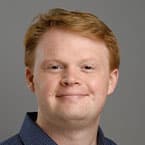
My current research evaluates proinflammatory cytokines and their role in tumor progression and metastasis in breast cancer. My research seeks to expand on this body of knowledge by evaluating the differential role inflammatory cytokines plays in varying subtypes of breast cancer patients, particularly in estrogen receptor positive versus estrogen receptor negative breast cancer. Additionally, in collaboration with other labs we are developing novel small molecule inhibitors (SMIs) against inflammatory cytokines, with the long-term goal of having clinically relevant therapeutics available to patients.
During my undergraduate career at Boise State University, I was initially unsure of my future career path. However, during my senior year, my interest in academic research sparked while taking the Molecular Biology of Cancer class offered by my now mentor.
It became obvious to me that research is my passion, especially in the context of academia. After graduating with my B.S. in Biology at Boise State University, I was accepted into the Biomolecular Sciences program. My master’s research involved evaluating novels to target inflammatory cytokines to prevent breast cancer metastasis, and recently received my M.S. in 2023.
I am currently working towards my doctorate with the long-term goal of obtaining a position in academic research. My primary research project is focused on evaluating estrogen receptor status in breast cancer patients and how cytokines promote breast cancer metastasis. I hope to expand the scientific body of knowledge by seeking to understand the interplay between hormone status and cytokine signaling in breast cancer This research is both basic and translational in nature and will provide crucial knowledge on how to address/treat cancer patients in the future.
In addition to research, I am also very interested in science advocacy. For the past 6 years I have been a lead volunteer with the American Cancer Society Cancer Action Network (ACS CAN). Over the past several years, I have travelled to Washington D.C to meet with our federal delegation to share the importance of NIH research funding with several advocacy groups, including ACS CAN, Rally for Medical Research, and AACR.
I am truly honored to serve on the AMC. I seek to support the professional development of early-career cancer scientists from all aspects of research, including those in smaller institutions, first-generation students, and researchers from diverse communities.